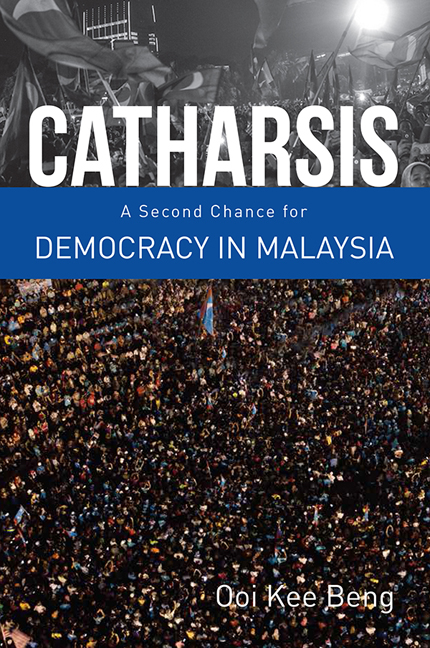Book contents
- Frontmatter
- Contents
- Foreword
- 1 Introduction – Malaysia's Future Is Redeemed
- Before Pakatan Harapan
- 2 After All These Years, Malaysia Is Still Held Hostage
- 3 Beyond the Nationalism Trap
- 4 Federating Malaysia — A Continuous and Troubled Process
- 5 Funeral for a True Son of Penang
- 6 Let's Work Out What Malaysia Is Good For
- 7 The Unity Fetish
- 8 When the National Narrative Loses the Script
- 9 Let's Be Cosmopolitan and Leave Multi-ethnicity Behind
- 10 Noses Don't Grow Back
- 11 Mahathir's Bersatu is Best Understood as an NGO
- Before 9 May 2018
- With Mahathir at the Helm
- Beyond 9 May 2018
- About the Author
6 - Let's Work Out What Malaysia Is Good For
from Before Pakatan Harapan
Published online by Cambridge University Press: 12 February 2019
- Frontmatter
- Contents
- Foreword
- 1 Introduction – Malaysia's Future Is Redeemed
- Before Pakatan Harapan
- 2 After All These Years, Malaysia Is Still Held Hostage
- 3 Beyond the Nationalism Trap
- 4 Federating Malaysia — A Continuous and Troubled Process
- 5 Funeral for a True Son of Penang
- 6 Let's Work Out What Malaysia Is Good For
- 7 The Unity Fetish
- 8 When the National Narrative Loses the Script
- 9 Let's Be Cosmopolitan and Leave Multi-ethnicity Behind
- 10 Noses Don't Grow Back
- 11 Mahathir's Bersatu is Best Understood as an NGO
- Before 9 May 2018
- With Mahathir at the Helm
- Beyond 9 May 2018
- About the Author
Summary
A wave of pessimism and dejection has been pervading Malaysia for quite a long time now. Exactly when it started is hard to say, but what has been obvious is that whatever potential lines of division that can be found in the diversity that characterises the country have recently been made more salient.
Relatedly, the types of criminality seem to have become harsher, suggesting that the social fabric is being worn very thin and that the economic situation for the lower classes has worsened dramatically. The recent abduction and beheading of a two-year-old girl in Kuala Lumpur stunned the country.
Homelessness has increased with as many as 1,500 people not only roaming the streets of Kuala Lumpur with no shelter but also being accused of preferring stealing and begging to ‘a normal life’. The latter bizarre verdict reportedly came from no one less important than the country's Minister for Women, Family and Community Development.
The planned implementation of a federal goods and services tax regime in April next year to ease state budgetary imbalances, whether well-advised or not, is not expected to help the less fortunate either.
Apart from deteriorating socio-economic conditions, inter-ethnic and inter-faith relations have been widening, pushed by small extremist groups with ties to the dominant party claiming mass media coverage for themselves way beyond their due – and certainly way beyond the merit of their arguments.
Religious authorities have also been overly eager in policing improprieties in Malaysia's highly pluralistic society, in one case taking Malaysians back to the trauma of observing a non-Muslim funeral being disrupted by Muslim authorities that took the deceased away from her family with the claim that she was a converted Muslim. The Penang State Shariah court rejected this claim a couple of days later. Such cases of ‘body snatching’ at funerals grabbed the headlines frequently several years ago causing great damage to inter-faith trust.
The ban on the use of certain words considered the monopoly of Muslims has also upset non-Muslims greatly, again undermining trust between the diverse communities that constitute the population of the Malaysian federation.
- Type
- Chapter
- Information
- CatharsisA Second Chance for Democracy in Malaysia, pp. 18 - 20Publisher: ISEAS–Yusof Ishak InstitutePrint publication year: 2018

